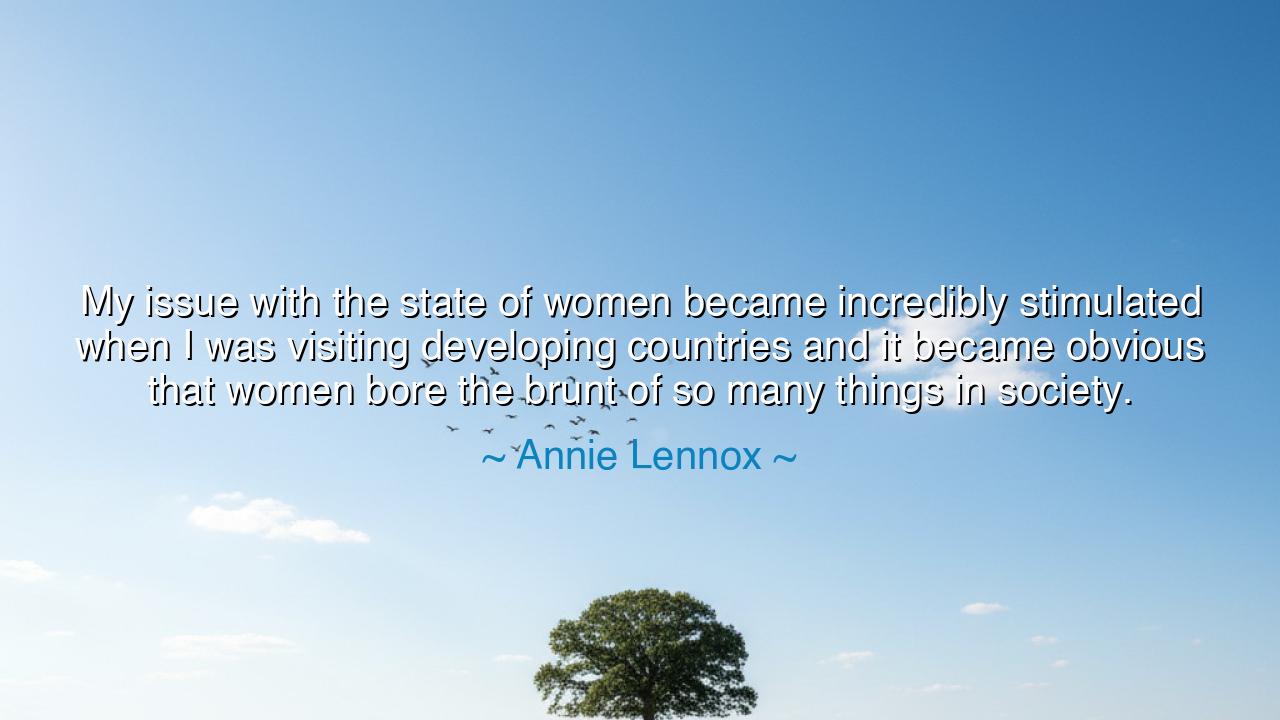
My issue with the state of women became incredibly stimulated
My issue with the state of women became incredibly stimulated when I was visiting developing countries and it became obvious that women bore the brunt of so many things in society.






The words of Annie Lennox—“My issue with the state of women became incredibly stimulated when I was visiting developing countries and it became obvious that women bore the brunt of so many things in society.”—are not merely an observation but a lament, a call, and a cry for justice. She speaks as one whose eyes were opened not by statistics or books, but by witnessing suffering with her own eyes. In the villages and towns of the developing world, she saw what many choose to ignore: that women, in their silence and endurance, carry the heaviest burdens—of poverty, of inequality, of violence, of endless labor unseen and unacknowledged. Her words remind us that oppression is not always hidden in chains; often it is woven into the daily fabric of life.
The ancients would have recognized this imbalance as a wound upon the body of society itself. For in many cultures, the strength of a people was measured by how they honored their women, mothers, and daughters. When women are degraded, society does not rise—it crumbles. Yet again and again, through the long story of humanity, women have borne the brunt of survival. They fetch water from distant wells, raise children in famine, endure wars they did not start, and labor without recognition. Lennox’s words draw us back to this ancient truth: when women suffer, all suffer; when women rise, all rise.
History provides us with living testimony. Think of Wangari Maathai of Kenya, who saw women struggling to keep their families alive as forests were cut down, water dried up, and soil eroded. In response, she began the Green Belt Movement, planting trees and empowering women to reclaim the land. From this humble act, she not only healed the earth but elevated the place of women in her society. Her story is an echo of Lennox’s recognition: that women in developing countries carry burdens placed upon them by poverty, by culture, and by neglect—but within their strength lies the power to transform nations.
Lennox herself, though known first as an artist and musician, turned her heart to advocacy because she understood that to see suffering and remain silent is itself a form of betrayal. Her words are born of the raw confrontation with inequality: of seeing women denied education, denied healthcare, denied the basic dignity of choice. Her revelation was not abstract—it was personal and immediate. The “issue with the state of women” became not a distant cause but a moral duty. In this, she joins the long line of prophets, sages, and reformers who declared that injustice anywhere is an injury to the whole.
Her insight also warns us of the cycle of exclusion. When women are held down, their children inherit the same cycle of poverty. When women are denied education, entire generations remain bound in ignorance. When women are silenced, the wisdom of half of humanity is lost to the world. To recognize that “women bore the brunt” is to see the chains not only on them, but on the future of all. Thus, Lennox’s words are not only about compassion—they are about survival and progress. A society that neglects its women cripples itself.
The lesson for us is profound: to uplift women is to uplift the world. Wherever we find women carrying unequal burdens, our duty is to lessen them. Wherever we see women excluded, our duty is to open doors. This is not a task for governments alone, but for each soul. In homes, in workplaces, in schools, men and women alike must labor to dismantle the unjust weight placed on women’s shoulders. Only then can balance be restored, only then can societies grow strong.
Practically, this means supporting education for girls, healthcare for mothers, protection against violence, and economic opportunities for women in every land. It means honoring the labor of women that too often goes unseen. It means listening—truly listening—to their voices, and shaping policies, communities, and cultures that reflect their dignity. For when women no longer “bear the brunt,” but instead share equally in building the world, then, and only then, will humanity stand whole.
Thus, Annie Lennox’s words endure as a testimony and a challenge: women bear the brunt of so many things in society. But they should not bear it alone, nor should they bear it at all. The burdens of the world must be shared by all humanity, and the liberation of women is the liberation of all. Let us then take her words as sacred counsel—to open our eyes, to act with courage, and to build a society where the weight of life does not fall on one half of humanity, but is carried equally by all.






AAdministratorAdministrator
Welcome, honored guests. Please leave a comment, we will respond soon